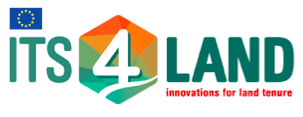What about ethics, security and quality?
Ethics
The its4land consortium has developed a comprehensive set of ethical guidelines and controls to ensure the project adheres to all EU, national, and institutional ethics standards. These relate to the use of human participants, the protection of personal information, and conducting research outside the EU. A dedicated ethics specialists is also included on the its4land Advisory Board (Dr. Michael Nagenborg, University of Twente). These its4land ethics guidelines and documents are available upon request from the Project Coordinator.
Quality
The quality of the scientific and technical content is ensured by the respective partners, however, a peer-review scheme has also been implemented internally to guarantee that the EC receives high quality deliverables and reports. To this end, each deliverable or regular report, needs to be submitted at least one month before due date to the project coordinator who in turn will distribute it to two consortium members for proof reading and review.
Security
The consortium is also on guard with regards to the potential malevolent or criminal usage of the planned land tenure recording toolset. On this, the use of UAVs are identified as a only potential security concern. However, it should be noted that the UAVs to be utilized in its4land are lightweight and unable to carry the type of payloads required for terrorist applications. The imagery produced by the UAVs may present another area of concern for malevolent use; however, the intended rural locations of all three use cases means this is also a very minimal, if not irrelevant concern. In addition, the three southern research partners are experienced in the legal operation and permissions process regarding ICT application within the countries. In Kenya, UAV flights require high level approval – although rural or small town application is less restrictive: TUK maintains links with the office of the President and the National Security Intelligence. In Ethiopia, laws for UAV flights do not exist: permission is granted on an ad-hoc basis; however, BDU maintains linkages with Ethiopian Internet Network Security Agency (INSA), the agency with the mandate for aerial mapping and survey. The Rwanda Civil Aviation Authority grants approvals in Rwanda.

Recent Comments